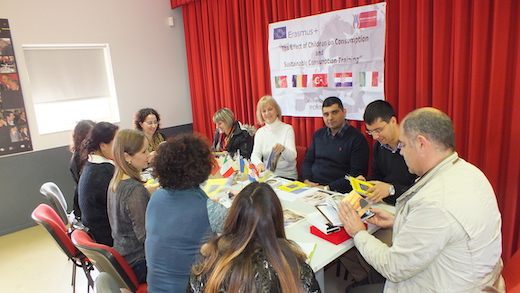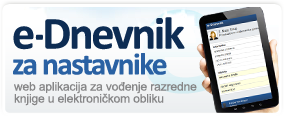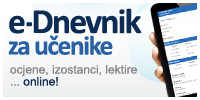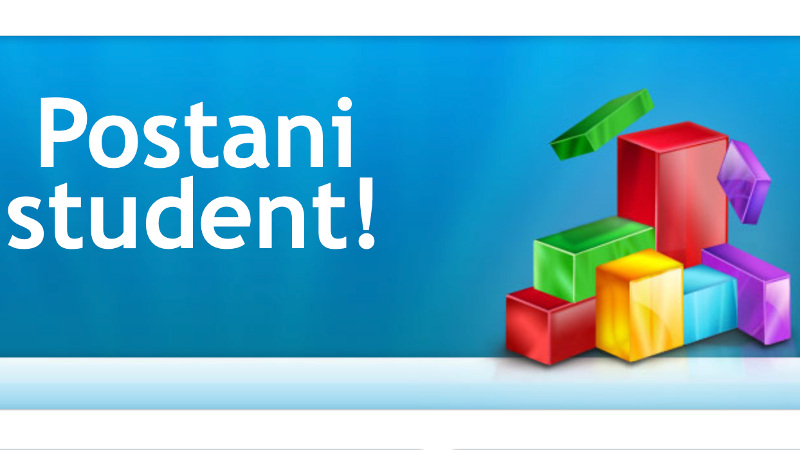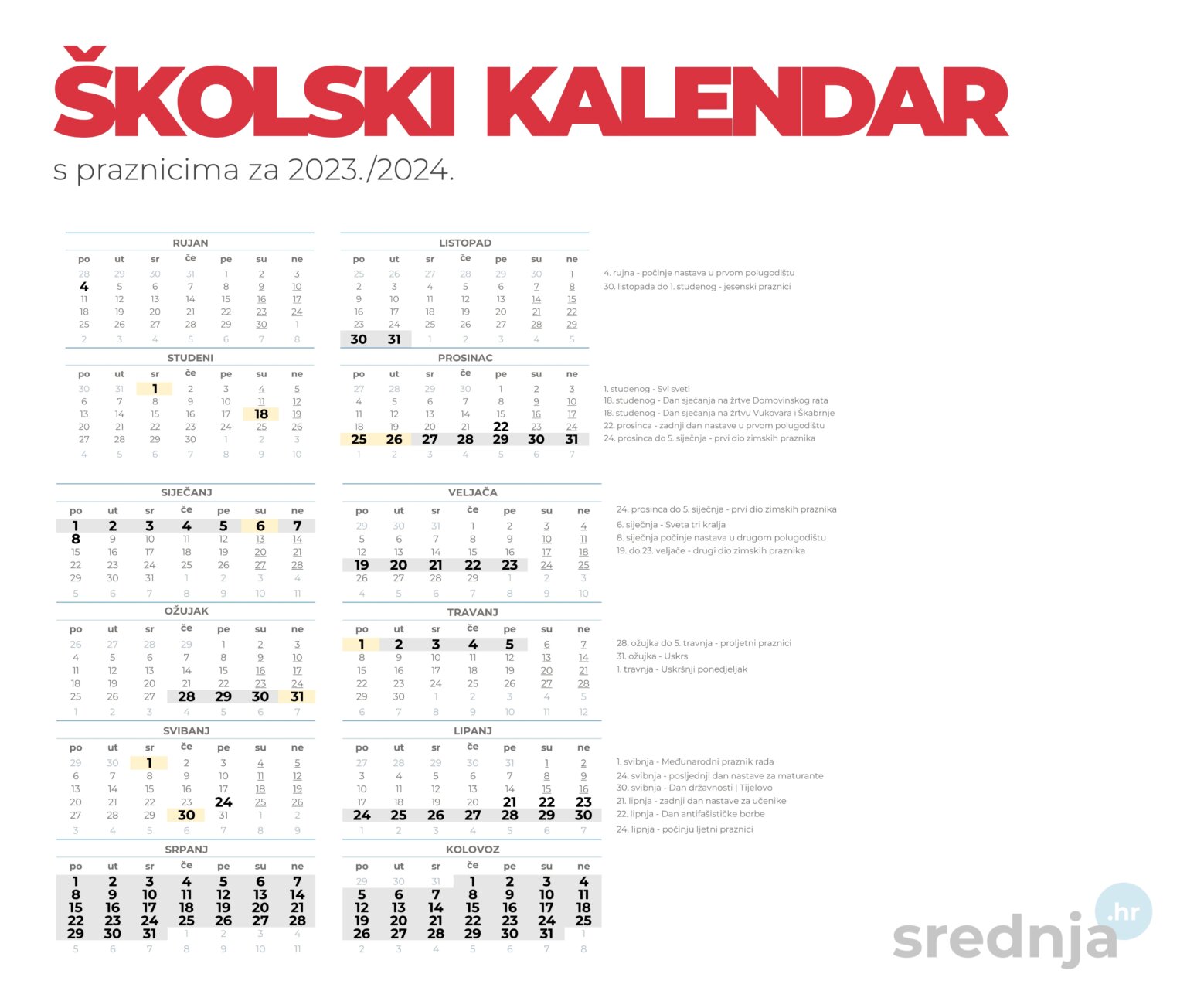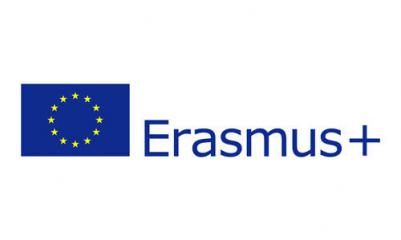Naša škola je u periodu od 2015. godine sudjelovala u sljedećeim projektima u kojima smo uspjeli povući ukupan iznos od EUR 105088.13.
- Projekt pod nazivom The Effect of Children on Consumption and Sustainable Consumption Training („Projekt“) u okviru programa Erasmus+, Ključna aktivnost 2: Strateška partnerstva, BROJ UGOVORA – 2015-1-TR01-KA219-021506_3, koordinator Turska - financijska potpora - EUR 24.050,00
- Projekt pod nazivom Climate and climate change. Influence of climate on Human populations („Projekt“) u okviru programa Erasmus+, Ključna aktivnost 2: Strateška partnerstva. BROJ UGOVORA- 2015-1-ES01-KA219-015646_5 , koordinator Španjolska - Financijska potpora - EUR 12.600,00
- Cross-Curricular Approaches to Mathematics and Sciences in Formal and Informal Contexts - projekt broj - 2015-1-RO01-KA219-015034_5 - koordinator Rumunjska. Ukupan odobreni iznos financijske potpore iznosi 20.662,13 EUR
- On the Move - projekt broj 2017-1-DE03-KA219-035591_3 - koordinator Njemačka - Ukupan odobreni iznos financijske potpore iznosi 22.300,00 EUR.
- GIFT-The magic of knowledge - projekt broj 2018-1-RO01-KA229-049390_4 koordinator Rumunjska - Ukupan odobreni iznos financijske potpore iznosi 25.476,00 EUR

The effect of Children on Consumption and Sustainable Consumption Training
The project comes from a strong desire to create a partnership with other European schools, but also from the need of many teachers to develop the European dimension in our schools and to strengthen the sense of belonging to a larger reality… Europe is a great opportunity for the younger generation, in a genuine process of renewal. Giving the opportunity to the teachers and students of the European schools to meet, work together, know each other is a great contribution for the consolidation of the basis of a great Europe”.
The project started in October 2015 and lasted until October 2016. The coordinating country is Turkey represented by the Military High School Maltepe Askeri Lisesi Komutanligi in Izmir. Portugal is represented by Forave, High School in Lousado, Croatia by Gimnazija Gospic High School in Gospic and Romania by the Technical College of Architecture in Bucharest.
The project is a KA 2 project belonging to the category of strategic partnership among schools and its frame-object is cooperation for innovation and the exchange of good practice. The main focus is the education of young people as regards responsibility for consumption of water, food energy and time. The specific objectives are the decrease of water and electricity consumption, the education for rational consumption of food and time, and the efficient use of the recycle system. The general objectives concern raising awareness of concepts such as European citizenship and democracy.
Italy was the second mobility after Croatia, in this meeting all the participants were invited to watch the videos about “sustainable consumption” which had been created and filmed by the students of each school partner. The topics of the drama activities had been decided in the previous meeting in Croatia: Turkey – Shopping Madness, Portugal – Food, Italy – Saving Money and Energy, Romania – Recycling and Reutilization, Croatia –Budget Planning.
The work done by the school partners will be shared: the curriculum for the following school year 2016/17, the survey about consumption and the questionnaire on European consciousness.
Project team: Edita Klobucar (koordinator), Anton Orzes (koordinator), Ivana Tomljenović, Amneris Anna Diminić, Leonarda Krajtner Ružička i Tihana Valentić
CLIMATE AND CLIMATE CHANGES. THE INFLUENCE OF CLIMATE ON HUMAN POPULATION
This project arose as a response to the needs of 5 partner schools form different regions in Europe. For the use of the project a set of common educational goals intended to be achieved by all partners was as follows: developing co-operative work among our students and institutions, and the use of new technologies. Improving the students’ and teachers’ language competence, promoting co-operation between educational institutions in different countries in order to deal with the same problems, improving the students’ knowledge of the European cultures, making our students aware of the importance of taking measures against the climate change. Apart from the coordinating institution from Spain, three other schools from Poland, Lithuania and Croatia took part in the project (the fifth school from Slovakia withdrew when the project was accepted).
We planned two transnational meetings at the beginning of each year of the project in order to plan work, monitor the activities and present the results. The first meeting took place in Elda, Spain in November 2015, the other one in Cracow in September 2016. Two representatives of each institution took part in each meeting. We also completed two mobilities in the project with five students and two teachers from partner schools in each one. The first one was in Gospić in Croatia in May 2016, the second one in Kaunas in Lithuania in May 2017. Both meetings were organised in order to present the results of each stage of the project, to summarise, to get to know each country’s culture and traditions, to exchange experience and good practices and to develop language skills of both the students and the teachers participating in the project.
We have chosen the theme of climate and climate change as a fundamental axis of our project, firstly because it is one of the European educational objectives which are compiled in the curriculums of different areas and move on to them. When we used these objectives as principal support, we achieved the twofold aim of making our students aware of the need of taking measures against the consequences of the climate change, and improving their communicative competence, self-learning, the use of new technologies, social integration and connection in the group.
The activities we have planned and designed about climate and climate change will enable us to promote the knowledge of different cultures involved in the project, within the framework of the European Union. This will serve to promote the idea of Europe as a unity among our students and to encourage cooperation among the participating institutions. Secondly, the use of ICT was a constant during all the project's lifetime. Our students have learnt to use new tools to create slide presentations, videos, searching for information and sharing their outcomes and conclusions. A project's website has been created by the students, in order to disseminate their work: https://cccka219.wixsite.com/climatechange
As the main project's language was English, and both students and teachers used it for communication as well as to present the outcomes, the language skills of all participants have been improved thanks to the project's implementation. Each country has its own national language skills assessment system, which has been used to measure this improvement.
During the first year, each school developed a research work on the climate in its region. Data related to own climate, flora, vegetation and fauna, soil types, main crops and cultural characteristics that could be related to the climate were included. The results were shared through expected channels (web, social networks, blogs), and a Conference was held at the end of the first year, where a selection of participating students lived together for 5 days and shared their experiences.
In the second year of the project, each country chose a topic related to climate change and developed it individually. As before, the results were shared through the available tools, and a project closing conference was held to present and share them.
Regarding to the European aspect, we have managed to create a team with presence of cultures of very diverse areas of the European Union and together we have a good representation of the main European climates. Since the climate is a factor which influences the culture of a country, the cultural variety was widely represented, and this was an enrichment for all members of the project. We discovered that despite a few differences we are all European citizens, we can communicate in English and take part in similar international projects in the future.
Klima i klimatske promjene: https://cccka219.wixsite.com/climatechange
Project team: Edita Klobucar (koordinator), Anton Orzes (koordinator), Anđelka Ivandić, Sandra Sertić, Josip Štampar
Climate and climate change
Podaci o ovom projektu mogu se pogledati na:
https://cccka219.wixsite.com/climatechange

CROSSCURRICULAR APPROACHES TO
MATHEMATICS AND SCIENCES
IN FORMAL AND INFORMAL CONTEXT
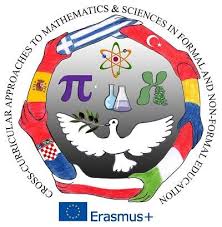
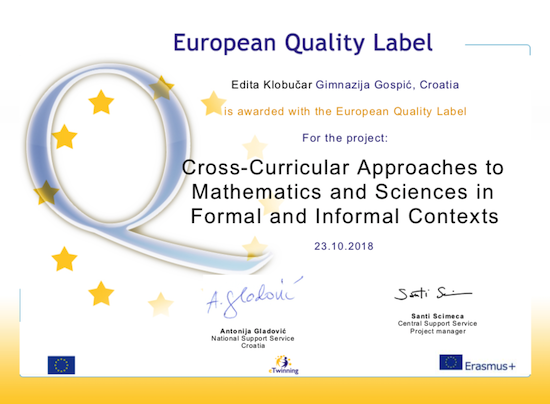
Project Summary
The idea for this project came from the realization that the students’ interest in math and sciences declined, which led to their poor results in the graduation exams. Also, people often complain about the gap between what is taught and what is needed in life and so, the students’ motivation for study constantly kept falling. The project wanted to address this sore issue by resorting to an innovative methodology: the cross-curricular approach in the teaching of math and other exact sciences, both in formal and informal contexts, special attention being paid to the development of digital and EN skills. By studying one particular topic from the perspective of other subjects, always involving ICT based methods, the connection between theory and practice was performed, while motivation and interest levels increased.
Objectives: We wanted to increase the motivation for study and to develop the thinking skills of ~300 students by using cross-curricular approaches and flexible learning pathways; We wanted to foster the EN/mother tongue and IT skills of ~ 700 students and 140 teachers, to contribute to the professional development of at least 140 teachers by enlarging their knowledge and developing their skills in using innovative cross-curricular teaching and managing the project activities. By organizing short-term exchanges for students, we instructed 70 students (10/partn) to become peer-trainers. Other objectives were: to foster the social and leadership skills of the students through the peer education system, to enrich the curriculum with optional courses through the elaboration and free distribution of the training kit and through the training sessions, to contribute to the professional development of a large no. of teachers.
There have been 7 partner schools, out of which 3 are high schools providing education in exact sciences and humanistic subjects (EL,HR, RO), 2 are scientific high schools (IT and TR), a vocational high school (PL) and a middle school (SP). The topic of the project was new to all and was a challenge as well as the opportunity to consolidate the quality of the educational services provided.
The tasks and responsibilities were agreed upon, all partners implemented all the activities, all of them were involved in all the stages of project management, some partners having special responsibilities.
All the project activities facilitated the study of the exact subjects through cross-curricular approaches in order to develop basic and transversal skills. Besides the transnational mobilities, where project issues were discussed, experience was shared and optimum solutions were found, we have envisaged 2 short term exchanges for students (80 students), designed to train the students as peer-trainers. These students have the experience, knowledge and skills to train other students, thus ensuring the sustainability of the project from within. Other activities: creation of the website,the poster, the logo, workshops for students , the e-learning platform, 2 optional syllabus hand books, (online) contests, peer-training activities of students and training sessions for teachers, constant dissemination and evaluation.
We maintained regular communication using the Internet, during the TPMs all problems were discussed, assistance was offered, procedures made, ceaseless monitoring, evaluation and special plans for the project risks.
Results:
1. the training kit (student's book , the teacher’s book , 2 video guides, a test book with key and a booklet with questionnaires for students and teachers.
2. the e-learning platform, in EN, with sections for all the 7 partners;
3. other results: the 2 optional syllabus hand books, the magazines of the contests, selection criteria for all stakeholders, dissemination materials, multimedia presentations, newsletters, diaries, questionnaires, reports, etc.
Through the implementation of the activities, we helped students better understand math and exact
sciences, the results obtained in the graduation exams and other contests being standing proofs, they got a more comprehensive view on the applications of math and exact sciences in life, while the teachers developed professionally through the training sessions organized and through their involvement in all the project activities; moreover, all the students involved in the peer-training activities developed their knowledge and skills in multiple directions. The intellectual outputs being freely distributed, we created tools for the development of a larger category of stakeholders . With the optional courses, where the national curriculum permitted, we enriched our schools' curriculum and we contributed to the institutional development of our schools, also raising their prestige within the local communities.
Project team:
Mr.sc. Edita Klobučar (koordinator), Anton Orzes (koordinator), Zvonimir Knežević, Valter Krajcar, Antonija Pavelić, Martin Potnar, Marijana Musić Mašić
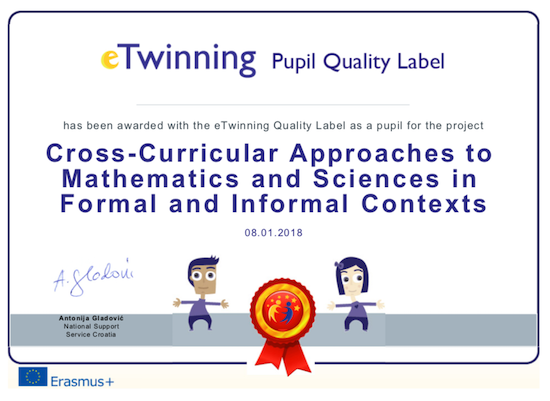
ON THE MOVE
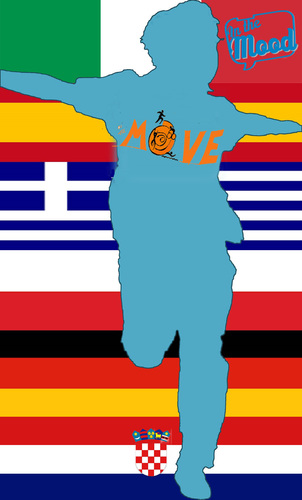
A survey from the EU about the health and the physical fitness of the European teenagers named “Helena” shows some dramatic results: Nearly every third boy and every fifth girl is too overweight. And every year the number of overweight young boys and girls increases in an alarming way.
It´s not only a problem of one nation. It´s a European problem!. We want to exchange our experiences and we want to improve our projects and daily activities to support the the teenagers to live a healthier life.
GIFT THE MAGIC OF KNOWLEDGE
This is an Erasmus+ project. European countries have not developed a uniform system to support gifted students. This varies from country to country being often neglected, invisible and left to be taken care of by individual teachers.
Instruction in public mixed classes often proves discriminatory for the gifted students who most often need challenges and be offered advanced content and complex learning methods to challenge their intellectual curiosity and exceptional problem-solving abilities across a broad range of disciplines.
The project‘s scope is to ensure fair education alternative learning opportunities for all gifted high school students in 6 European schools, for a period of 2 years by using a highly participatory project centered approach.
| « Kolovoz 2025 » | ||||||
| Po | Ut | Sr | Če | Pe | Su | Ne |
| 28 | 29 | 30 | 31 | 1 | 2 | 3 |
| 4 | 5 | 6 | 7 | 8 | 9 | 10 |
| 11 | 12 | 13 | 14 | 15 | 16 | 17 |
| 18 | 19 | 20 | 21 | 22 | 23 | 24 |
| 25 | 26 | 27 | 28 | 29 | 30 | 31 |
| 1 | 2 | 3 | 4 | 5 | 6 | 7 |
Ukupno: 125075
Ovaj mjesec: 2180
Ovaj tjedan: 708
Danas: 26


